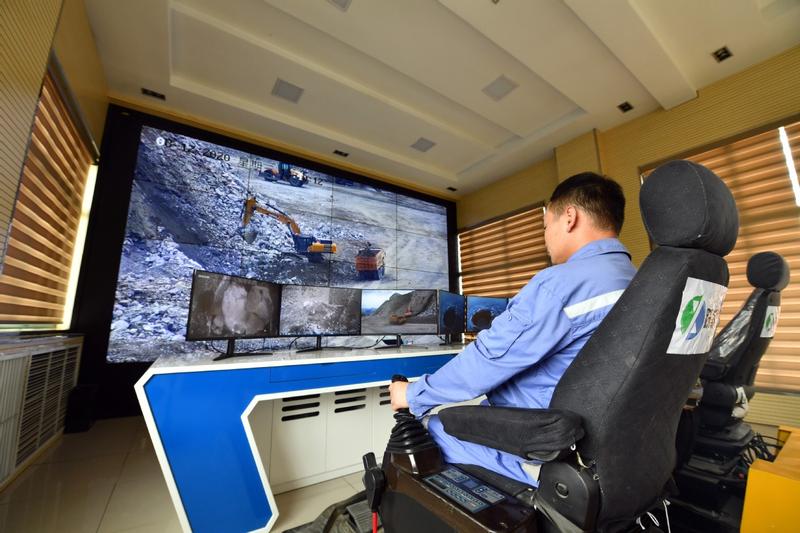Steel, automobile, hydropower among important sectors pursuing transformational shifts in modes of doing business
 A 5G powered smart factory model is on display at the World 5G Convention in Guangzhou, Guangdong province, on Nov 26. (DENG HUA / XINHUA)
A 5G powered smart factory model is on display at the World 5G Convention in Guangzhou, Guangdong province, on Nov 26. (DENG HUA / XINHUA)
Factories in China are increasingly going digital, internet-connected and smart, thanks to growing application and integration of 5G and industrial internet technologies, government officials, company executives and experts said.
From using machine vision technologies to automatically inspecting industrial products to employees harnessing 5G to allow remote control of cranes in steel plants hundreds of kilometers away, industrial production is becoming more efficient and safer in reality.
Xiao Yaqing, minister of industry and information technology, said over 1,100 projects that focus on implementing integration of 5G and the industrial internet have been built across China.
"China's industrial internet is entering the fast lane, with a wide range of applications having emerged in manufacturing, healthcare, energy, smart ports and other sectors," Xiao said.
China's rapid 5G rollout has laid a sound network infrastructure for better use of the industrial internet, he said. The nation so far has erected more than 700,000 5G base stations, about twice the amount in the rest of the world.
Xiao Yaqing, minister of industry and information technology, said over 1,100 projects that focus on implementing integration of 5G and the industrial internet have been built across China
ALSO READ: Xi sends congratulatory letter to 5G & industrial internet summit
Zhao Houlin, secretary-general of the International Telecommunication Union, said via video link, China has built the largest commercial 5G network, and the nation's consumer internet and industrial internet have also entered the fast lane, putting China among the leaders in global innovation and development.
The industrial internet refers to the convergence of industrial systems with the power of advanced computing, analytics, sensing and new levels of connectivity.
It used to be jargon known only to telecom industry insiders, but now the term has wider resonance with people from a wide range of sectors, with front-line workers particularly benefiting from the technology.
Liu Jiwen, who is in charge of Hunan Valin Xiangtan Iron and Steel's 5-meter-wide thick plate production facility, said he has a deep sense of what the integration of 5G and the industrial internet can deliver.
In a control room of the company's steel plant in Xiangtan, Hunan province, four technicians operate joysticks to remotely control bridge cranes in a neighboring high-temperature plant. Via a big screen that displays real-time video of the plant, the employees monitor the processes and all the equipment moves about in an orderly fashion.
"Previously, the control center had to be placed within a steel plant to allow it to control the process without a time delay. We had to work in an environment with high temperatures, noise and dust. But all of this has changed due to the 5G network," said Liu.
Liu added that 5G's low latency and big bandwidth allow the control center to be located in a comfortable workspace outside of the mill and just one employee can remotely operate multiple bridge cranes simultaneously, thus significantly boosting efficiency.
This is in stark contrast to the often seen image of steelworkers toiling away in mills amid difficult conditions. The typical labor-intensive iron and steel industry is undergoing transformations thanks to the commercialization of 5G and other cutting-edge technologies.
The steel plant also offers a glimpse into how Chinese tech companies are scrambling to partner with a wide range of traditional sectors to promote the industrial use of 5G and unleash the full potential of the most advanced communications technology so far.
Auto manufacturing is also getting upgraded thanks to the use of 5G and the industrial internet. Zhu Yanfeng, chairman of Dongfeng Motor, a major carmaker based in Wuhan, Hubei province, said, "The application of 5G and the industrial internet has helped the company shorten its entire product development cycle from 36 months to 24 months."
Also, technologies make its manufacturing more resilient and better able to recover from the COVID-19 pandemic, which hit Wuhan hard early this year, Zhu said.
 At an intelligent dispatch center in Luoyang, Henan province, an employee controls excavator operations remotely. The technology is backed by 5G. (LI JIANAN / XINHUA)
At an intelligent dispatch center in Luoyang, Henan province, an employee controls excavator operations remotely. The technology is backed by 5G. (LI JIANAN / XINHUA)
The combination of the industrial internet and 5G can also make hydropower stations function better. Tingzikou hydropower station in Guangyuan, Sichuan province, has deployed 5G networks from China Mobile with a private industrial internet built for the station.
With the help of 5G networks, an underwater robot can be used to automatically inspect the hydropower station's water volume to ensure safety and efficiency.
Wang Haoran, an expert from Tsinghua University's Sichuan Energy Internet Research Institute, said every three to five years, or following every major flood, the Tingzikou station's stilling basin undergoes a thorough check.
In the pre-robotics era, workers would undertake deep dives to conduct such checks, which were relatively inefficient, time-consuming and tended to interrupt electricity supply. "Such a process could consume three to six months and cost around 5 million yuan (US$748,000)," Wang said.
But 5G robots can accomplish the task in about 20 days as they obviate the need to pump out water from the basin and can do some basic work like removing silt. "The cost of each check can be lowered to 700,000 yuan," said Wang.
READ MORE: China leads world 5G growth with 700,000 base stations
5G-powered aerial drones are also used in dam checks. By integrating artificial intelligence, big data and other cutting-edge technologies, China Mobile has built a high-precision dam surface inspection system that uses autonomous 5G drones, which can map in 3D.
These real-case applications of 5G and the industrial internet showcase the strides China has made in using these technologies. They are partly the result of the central government's push to strengthen local companies' competence in the sector.
The industrial internet is a frontier technology in which countries around the world are scrambling to establish a beachhead. It is an essential part of China's industrial upgrade drive that attempts to boost the marriage between cutting-edge digital technologies and the manufacturing sector.
The State Council-the country's Cabinet-unveiled a guideline in November 2017 that aims to build three to five industrial internet platforms which will reach international standard by 2025 and lead the world in key areas by 2035.
As of May, more than 70 industrial internet platforms with regional or sector-wide influence have emerged in China.
Zhang Yong, CEO of Alibaba Group, said the industrial internet's future lies in its deep integration with the consumer internet, which will help build a vibrant market-oriented and market-driven economy, as well as push forward supply-side reforms.
Zhang cited clothing manufacturing as an example.
"The era when production determines consumption has gone." The integration of the industrial internet and the consumer internet is enabling on-demand manufacturing. By connecting both the supply side and the demand side, such integration allows companies to rapidly produce tailor-made clothing for consumers at scale.
"Through such flexible production, companies can avoid greater inventory risks and better meet external market demand during the process of pushing products into the market," Zhang said. He said such a mindset will also penetrate into other areas, which will promote the perfect integration of the industrial internet and the consumer internet.
Liu Duo, head of the China Academy of Information and Communications Technology, a government think tank, said a technology or industry must prove it can help companies boost quality and efficiency as well as reduce costs if it wants to be used on a large scale. The industrial internet has already proved its potential in these aspects.
"As China steps up its push to build stand-alone 5G base stations, the industrial internet will see a golden development period," Liu added.


